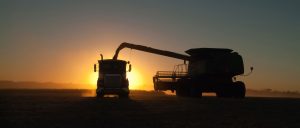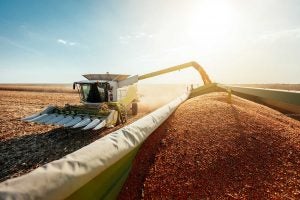Usually when my dad comes to visit, he brings a change of clothes. That’s mostly because I sometimes have “little” projects that I need help with. And there’s inevitably something he thinks needs to be serviced, cleaned out, or trimmed around the house. So he arrives in his “work” clothes and boots, and has something cleaner and nicer to put on before we get dinner.
But one recent weekend as we were finishing our plates, he said something that I wasn’t really ready to hear.
“We need to check your water softener to see if it needs more salt. And I don’t think you have any more bags, so we need to go grab some,” he stated. “Because harvest will start soon.”
Harvest. Will. Start. Soon.

To most people, that warning probably doesn’t seem so ominous. It’s just harvest. Sure, there will be more activity on the farm. And they’ll be busy and working in the fields. It’s a big production and an insane feat each year. No big deal, right?
But to me it is a big deal. Because that statement means one thing: I’m going to be a “harvest orphan” soon.
What is a harvest orphan? Said more dramatically, it means that I’m losing my family while they’re trying to bring the crops in for the next few months. They’ll start early in the morning … and finish long after dark. They’ll work seven days a week. And when it rains — forcing them to quit — they’ll stay home and rest instead of coming to visit.
In other words, no “little” projects from dad for a while. If I want to see them, I’ll have to find them in the field and climb into the tractor, combine, or truck. If I want to share a meal, I’ll have to either cook something or pick it up and deliver it. We won’t watch college football together. They won’t take my dog Mischa for a walk on the farm. And if I stay for the weekend, I’ll mostly be by myself.
I’ll admit that I didn’t make up the term completely on my own. I first saw this idea when other ag writers started calling themselves “harvest widows.” These are wives who suddenly become single parents while their husband toils in the fields all fall. They work, take care of the kids, keep the house and lawn, cook all the meals, do all the school runs, and constantly wash laundry. So they feel as though they’ve lost their husbands to harvest.
While I didn’t understand the feeling at the time, I certainly do now. When I lived on the family farm, it was somewhat nice to come home and not have anyone around until later in the evening. I wasn’t even that alone because dad would be back to dump the truck every 40 minutes or so. Now that I live farther away and can’t zip over, it makes actually seeing them more difficult.

Don’t get me wrong, I still love harvest. Fall is my favorite season. I love riding in the combine and all the hustle and bustle. I love being part of this massive operation that (mostly) runs flawlessly. I enjoy seeing the bounty from all the hard work and patience. It sorta feels like running a victory lap.
But it also means my family is going to be really super busy. They won’t be around as much for the next few months. I won’t see them as often. It’s a sacrifice (and I use that word very loosely) that they make to do what they love. That’s why we so often referring to farming as a “lifestyle.” It really is.
So I’ll be thinking about all our farmers as they rev up the combine, pull out the gravity wagons, and hook up the augers. My hope is for a good crop, no breakdowns, and decent weather. And I’ll remind everyone to slow down, pay attention, and stay safe.
I’ll also be thinking about my fellow harvest orphans and harvest widows. Yes, your feelings are real. And we’ll get through it.
Amanda Zaluckyj blogs under the name The Farmer’s Daughter USA. Her goal is to promote farmers and tackle the misinformation swirling around the U.S. food industry.



